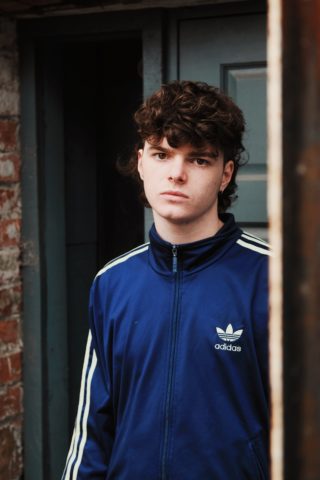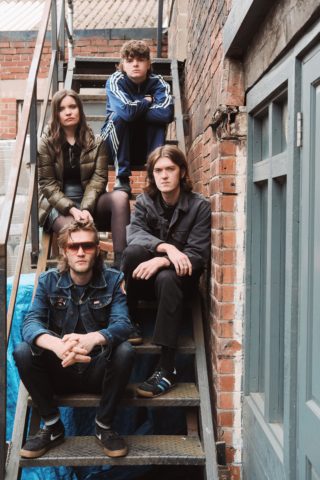Working Men’s Club – love, hate, the music industry, and a bit more hate
Syd Minskey-Sargeant has some opinions he'd like you to hear

Syd Minskey-Sargeant has some opinions he'd like you to hear
There’s more than a hint of the old Sheffield to Attercliffe, the suburb on the north-east side that’s become home to a quiet musical revolution in recent years. Crumbling warehouses and rusting ironmongery hint at the city’s steel-making heyday. It was precisely this kind of post-industrial landscape that fostered an electronic renaissance here in the seventies and eighties, from which the likes of Cabaret Voltaire and The Human League sprang forth. From behind McCall Sound Studio’s imposing red gate on Warren Street, Ross Orton has been at the centre of cultivating a similarly fruitful creative resurgence of late. His resume boasts local royalty (he was behind the desk for Arctic Monkeys’ AM, and drummed on the first two Jarvis Cocker solo albums) but more vital is the work he’s done with emerging artists, producing for the likes of Drenge, Menace Beach and Amyl and the Sniffers, and playing on the debut album by The Moonlandingz, who have a host of their own connections to the area (Fat White Family’s latest, Serf’s Up!, was cut at their own place a few hundred yards up the road).
None of this was lost on Syd Minsky-Sargeant when he was paired up with Orton last year. He formed Working Men’s Club at BIMM, a Manchester music college, in 2017, and the surprise success of early single ‘Bad Blood’ quickly led to a clutch of labels putting offers on the table. Heavenly Recordings won out and changed the band’s course, redirecting them to Sheffield, where Orton seemed like the ideal mentor for their increasingly electronically-minded frontman.

All of which sounds straightforward. In practice, it was anything but. The higher profile afforded to a very young band by ‘Bad Blood’ set off an epic power struggle within it; one that has left Minsky-Sergeant as the last man standing. On a suitably overcast July morning, he emerges into McCall’s front yard with a grin, offering a tracksuited elbow by way of socially-distanced introduction. The rest of the group are here, but only for the photo shoot; Minsky-Sargeant prefers to handle interviews alone. At the end of a long period of high acrimony, his big mouth and even bigger ideas have allowed him the space to rebuild Working Men’s Club in his own image – not in Manchester or his native Todmorden, but here in Sheffield. He is still only eighteen years old.
The bare bones of the matter are that founding members Giullia Bonometti and Jake Bogacki are out, with Minsky-Sargeant absolving only the former of any blame. “We don’t have the problem of egos and combative situations any more,” he says. “It was nice to just walk into the studio for two weeks and not worry about arguments, not have to deal with any politics.” Incoming are Rob Graham of Drenge and Mairead O’Connor of The Moonlandingz, although neither had much involvement with the record. “About 80% of it is me, and the other 20% is a mixture of members past and present, including Liam (Ogburn, the bass player rounding out the new lineup). “I think you can tell that it’s a very personal album. I was very bothered about having it turn out like I saw it in my head, and as soon as you take a demo into a room, everybody wants to put their own mark on it. Which is great, except a lot of the time people were taking it too personally, and their egos were getting in the way. For me, if I put something down and it’s shit, I’ll just say it’s shit.”
When ‘Bad Blood’ took off, soul-searching followed. “Suddenly, everybody wanted to know who we were and what we sounded like, and ‘Bad Blood’’s a good tune, but it’s definitely not symbolic of what the band’s about. I felt like having signed a significant record deal so early on we had to take it seriously. It’s very easy to fall into that hole of just letting people tell you you’re great. I didn’t want to be swayed – I wanted to trust my gut, and to make the music I’d intended to make from the start.”

The self-titled debut, then, is Minsky-Sargeant’s own vision realised. It’s still a pop record, just not the one that ‘Bad Blood’ hinted they’d make. Things have taken a moody turn for the atmospheric, with live drums eschewed and guitars used mainly for colour and punctuation. At the core of it, instead, is Minsky-Sargeant’s burgeoning fascination with synthesisers and drum machines. The key collaborator was clearly Orton, even if Minsky-Sargeant was turning up to the studio with fleshed-out demos, as if to deliberately limit the extent to which they could be remoulded. “I was never going to walk in with a bedroom demo that was just an idea, and then have to produce the fuck out of it. We didn’t do what Dan Carey does, which is just press play,” he says, in the first of a number of shots across the bows of his contemporaries he fires today. “That’s one way of doing it, but ours was more thought-about. We spent a lot more time talking about the album before we walked into the studio and played.”
Minsky-Sargeant met Graham and O’Connor, both Sheffield natives, through Orton’s studio – another indication that the band’s centre of gravity is shifting firmly towards south Yorkshire. He cites local influences, too, pointing out the electronic parallels between Sheffield and Detroit in the eighties, and appearing happy to be able to lean away from the label of Manchester band. The group still enjoy a larger fanbase on the other side of the Pennines than anywhere else, and whilst there’s unavoidable points of comparison there too – with New Order and The Fall, in particular – Minsky-Sargeant has never hidden that he finds Manchester’s current landscape uninspiring. And anyway, he says, the songs that make up Working Men’s Club are actually rooted in neither city, but rather in the Calder Valley, where he still lives in Todmorden, and where, four miles down the road, the Hebden Bridge Trades Club hosted early shows and inspired the band’s name.
“The heritage in Manchester is very overwhelming, which is why the music is so bland there,” he says. “It’s gotten very stuck in the past. It pisses me off that people try to label you as one thing or another. I just don’t think it’s necessary to pigeonhole a band based on where they come from. The ideas behind all these songs go back to Tod, in terms of what they’re about, but I never could have gotten this far if I hadn’t left to go to college in Manchester, or to work with new people in Sheffield. Where we’re from is only relevant in that we’re a northern band, and that comes with its own pressures, partly because you’re up against so much history, and partly because you have to graft so much harder to get noticed, because all the labels are in London. We’re not some fucking band from south London that got lucky because they played one gig at the Windmill, which seems to be the case for a lot of them now.”

Simmering frustration with small-town ennui is maybe Working Men’s Club’s prevailing theme: as Minsky-Sargeant puts it in typically unvarnished fashion, “it was a rough area, I hated the people I was around, and I hated going to school and never being told what I could do, just what I couldn’t do, and what would go wrong for me if I didn’t get any qualifications.” He’s less easily drawn on the record’s politics, which is a touch surprising given that a live-streamed show from YES in Manchester earlier in July saw him perform in a t-shirt emblazoned with ‘SOCIALISM’ and end the set by ripping off the head of a life-size cardboard cutout of the Queen, neither of which were exactly exercises in subtlety. Neither, for that matter, is ‘Cook a Coffee’, the most pointedly political track on the album. Provisionally titled ‘Defecate on the BBC’, it takes direct aim at Andrew Neil: “You look like a cunt,” Minsky-Sargeant drawls in a manner that suggests the ghost of Mark E. Smith might have possessed him. “You bark like a bitch.”
Still, he’s reticent on the issue. “Actions speak louder than words, I think. It’s good to make a point and be a little bit controversial. I just don’t want to put too much of a foot in the sand right now. I’m still a teenager, you know? I might be a very different person in two years. And a lot could change for our generation in that time. It’s just that I’m not making music for any other reason than I feel like I need to – I’d be such a fucked-up person if I didn’t. I’m not doing it because I want to be some big artist with a big platform, or to preach to people like Idles do.”
He will, later, go on to excoriate the government for their handling of the pandemic: “Fifty thousand dead because they care more about the economy than people’s lives. It sums up ten years of austerity.” The lockdown has had its own effect on Minsky-Sargent, not least because it’s seen Working Men’s Club pushed back from June to October (“We’d probably be in fucking Spain or somewhere now.”). He understands why, even if he clearly has already adopted a zero-tolerance attitude to the way in which the industry runs. “It’s a love-hate relationship, in that I fucking hate it, but I also have to thank it,” he says at one point, whilst discussing his discomfort at the need to brand and market his songs. “The fact of the matter is that we need to play shows and do in-stores and things like that, and we weren’t going to be able to do that in June. We’re not Sports Team, where we’re signed to a major and can just have Lewis Capaldi tweet about how great we are to a million followers, and still end up with a number two album.”

He has mixed emotions about spending several more months than planned sitting on the record. For one, his mind is already on the “cinematic” follow-up, which is written but on the back burner until this release is out of the way. In the meantime, he’s working on a side project, Minsky Rock, with Orton. He’s already weird about revisiting the album in order to talk about it with journalists, or to play the songs for the recent livestream – “I’d forgotten that we played guitar in this band,” he says. There’s even some indication that the extra time to dwell on the record has been outright unhealthy: the scars of the battles he won in order to do things his way evidently remain very fresh. “There are people high up on the credits of the record that I fucking hate, now,” he mutters darkly. “I’d smash their face in if I saw them.” This, admittedly, would be an easier threat to take seriously if he didn’t bear a striking resemblance to the central character from Mike Mills’ 20th Century Women, who in one scene is soundly beaten by a gang of punks for having the temerity to like Talking Heads.
He remains confident that he’ll be vindicated when Working Men’s Club finally sees the light of day; that the turbulence and upheaval will prove worthwhile. “It’s been a very weird world to walk into – as a child, really,” he reflects. “A scary world, where people can twist and turn and fuck you up the arse. You live and learn, and I think we’re going to prove that we’re not just a post-punk revival band, and that we actually never were. There’s been a lot of fucking shit in this band that’ll probably never come out, unless I write a fucking book, but it was always about the music. I don’t care if the album sells ten thousand copies or zero. If I’m working as a postman in ten years’ time, I’ll still be messing around with synthesizers. That I can guarantee you.”
The eponymous debut album from Working Men’s Club is out on 2nd October via Heavenly.